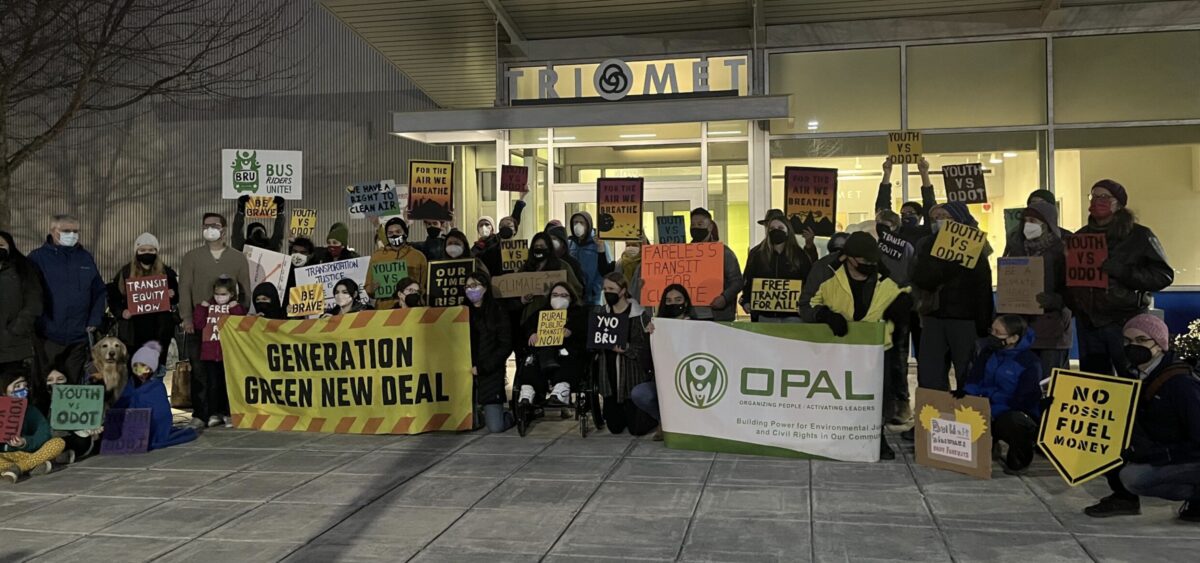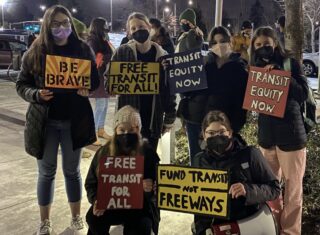
(Photo: Taylor Griggs/BikePortland)
On Transit Equity Day last Friday afternoon activists teamed up for a rally to advocate for public transit investment in the Portland Metro area.
“TriMet must see itself less as a business, and more as a provider of a fundamental human right.”
— Maia Vásconez-Taylor, Bus Riders Unite
The rally was staged outside TriMet headquarters in southeast Portland, and included activists from Bus Riders Unite (OPAL Environmental Justice Oregon), Youth vs. ODOT (Sunrise PDX) and other community groups.
Transit Equity Day is celebrated on Rosa Parks’ birthday to commemorate how she pushed for all people to have equal access to public transit. Parks’ initiation of the Montgomery Bus Boycott in 1955 was foundational to the Civil Rights Movement.
But activists speaking at the rally said that segregation and inequity are still very present in public transit today. They made the connection between accessible, frequent and fare-free transit and the climate crisis, saying that if we want to take serious climate action and get people to drive less, governments need to invest more in public transit and bike infrastructure and less in building and expanding freeways.
Cassie Wilson, a climate, transportation and disability activist who co-founded the Sunrise Movement’s Rural Oregon chapter, talked about her experience navigating transportation as someone who uses a wheelchair.
“I will never be financially secure so long as I’m dependent on a car to get around.”
— Cassie Wilson
“Next month I’m spending every dollar I’ve ever saved on a wheelchair lift for my van…It feels like it will never really end, because I’ll always be having to save for the next thing, like repairing my brakes or renewing my insurance,” Wilson said. “I will never be financially secure so long as I’m dependent on a car to get around.”
Advertisement
Speakers at the rally added that people of color and those with low-incomes also face barriers when it comes to being able to get around without having to rely on a car.
“The burdens of our inequitable transportation system are placed on people already burdened by other systems of oppression,” Wilson said.
Back in September we reported on an Oregon Department of Transportation study that showed race and income are directly correlated to rates of deaths and injuries among road users.

(Photo: Taylor Griggs/BikePortland)
People of color are overrepresented in traffic fatalities in Portland, and people who live in lower-income neighborhoods farther from the city center, like in east and north Portland, don’t have the same access to public transit as people who live in wealthier parts of town.
As the sun went down behind the TriMet building and the air started to get chilly, activists at the rally led the group in a series of chants. “We are unstoppable, another world is possible! We are unstoppable, better transit is possible!” the group sang. The famous union anthem “Which Side Are You On” also rang out from the rally, putting a sharp point on activists’ ask that TriMet and the Oregon Department of Transportation choose public transit investment instead of freeway building.
A few TriMet employees, like Multicultural Programs Manager Martín González, showed up at the rally in support of the protesters. Elected officials like Hoa Nguyen, who serves on the David Douglas School Board, and Nadia Hasan, who is on the Beaverton City Council, spoke as well.
“Oregon has some of the highest chronic absenteeism rates in the country. Kids just aren’t coming to school,” Nguyen said. She added that lack of access to transportation is a big reason that kids can’t get to school on time or at all, and wants to do more work to connect TriMet services with public school districts.
Overall, the message at the rally was that public transit is a right, and people shouldn’t be exploited for a profit just because they want to be able to get around freely. Activists called on TriMet to choose serving the people of the Portland Metro area over making a profit.
“TriMet must see itself less as a business, and more as a provider of a fundamental human right. It should be accountable first to its riders,” Maia Vásconez-Taylor, Community Organizer for Bus Riders Unite! said. “Rider demands should be prioritized above any budget, any profit or making any bottom line.”


